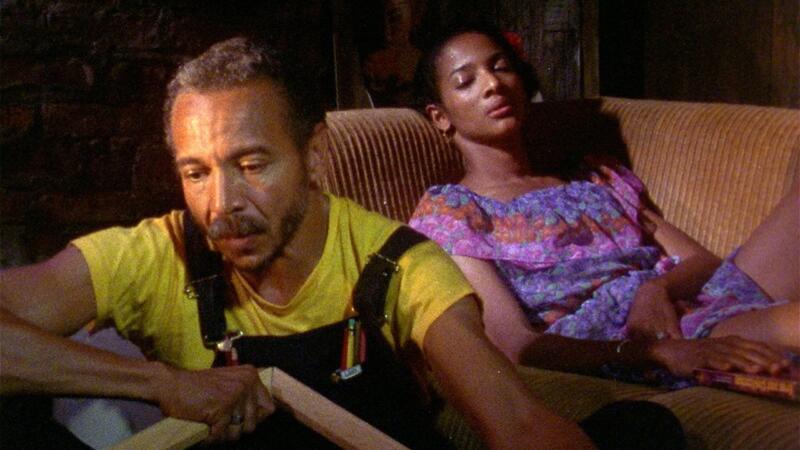
I can only imagine what it must have felt like, watching this in the year of its initial release (1982), not-so-far removed from the previous decade in American cinema that was dominated by exploitation films – specifically Blaxploitation films. And while East Coaster Kathleen Collins didn’t emerge from the celebrated L.A. Rebellion film movement, her work certainly contributed to what was then a new generation of upstart African and African American filmmakers, who created a “Black Cinema” that acted as an alternative to dominant classical Hollywood cinema – especially where representations of people of African descent were concerned.
That “Losing Ground” still feels fresh, over 3 decades later, is not only a testament to its timelessness, but also is sadly indicative of how scarce complex depictions of the inner lives of women – specifically black women – are, in contemporary American cinema; especially when handled with such majesty and artiness.
That the woman at the center of the narrative (Sara, played by Seret Scott) is an academic – a priggish philosophy professor in search of an “ecstatic experience” – further distinguishes her eventual unraveling, and thus the film, creating a uniquely satisfying experience.
Along with her bohemian husband, an artist of highly provoking disregard, the couple, at a crossroads, rent a summer country house to celebrate his museum sale. But what was to be an idyll summer (she, researching “ecstatic experiences,” and he, living them) is challenged where their conflicting intellectual and orgiastic pursuits collide. Chaos and confusion disrupt her carefully ordered, distinguished, middle-class life, when her painter husband, maybe experiencing a mid-life crisis of his own, takes interest in one of his young subjects. Sara gradually drifts even further into herself, into her search for what at first is evasive, if only to escape the realities of a seemingly crumbling marriage.
An exercise in psychoanalysis, centering on the neuroses and anxieties of a 30-something-year-old woman, “Losing Ground” is filled with absorbing psychological and social observations. But what is unusual about Sara is not necessarily her plight, so much as the way Collins characterizes her as the center of a quiet storm of almost dreamlike interruptions, including her interactions with a seemingly mysterious stranger – a charming out-of-work actor played by Duane Jones – who revels in a similar kind of intellectual engagement, and who is introduced into Sara’s life at an opportune moment, in her search for “ecstatic experiences.”
Ecstasy comes from the ancient Greek “exstasis,” which literally means “standing outside.” In Greek mythology, it eventually came to mean moments when a door in one’s soul opens up, fostering an intense feeling of an expanded sense of being – or euphoria – and one feels connected to a spirit (or God). Essentially, in moments of ecstasy, you stand outside of yourself, and God appears within you.
In philosophy (given that our protagonist is a philosophy professor), according to Plato, ecstasy can be achieved in one of 2 ways; first, the way of the philosopher, who, after many years of thoughtful observation and study, eventually understanding how this inspiration occurs, attains an ecstatic knowledge – a moment of divinity. The other path is the way of the artist, who suddenly gets seized by a rapturous moment and goes into an “ecstatic trance,” a sort of divine madness.
Coincidentally, Plato believed the former to be the superior path to “ecstatic experiences.” And it’s maybe no coincidence then that Collins’ key “Losing Ground” characters are a philosophy professor (the film’s protagonist, through whose eyes the story unfolds), and an artist (her husband, Victor, played by Bill Gunn), whose experiences are then considered essentially inferior, assuming Plato’s reasoning was of influence on Collins here; a suggestion quite possibly underlined by the film’s shocking metaphoric climax. Sara is offered a kind of ersatz opportunity for release (via her starring in a student’s film version of the mournful folk song “Frankie and Johnny”), after much internal anguish, seemingly inhibited by an assortment of experiences, instructed by a society that emphasizes the need for self-control, and thus restraint from a full range of expression, especially in women. It’s as if Collins wants to instruct us on the art of losing control without causing damage (physical, emotional) to oneself, and maybe more importantly, those around us.
Most films of this nature end with the wife making some glorious escape, from what is typically akin to an emotional prison; However, “Losing Ground” goes for something much bolder, and layered.
Although it’s all entirely open to interpretation.
What immediately strikes about “Losing Ground” is the visual splendor that director Kathleen Collins and cinematographer Ronald K. Gray (who also shot Ayoka Chenzira’s “Alma’s Rainbow”) present on screen. It plays off star Seret Scott’s wonderfully subtle and restrained performance to create a delight of sights and sounds.
It’s a very rare occurrence when the matter of a near-middle-aged black woman’s psychic nature, is so generously examined, and sumptuously illustrated in rich, symbolistic terms, bringing to life the dreams and disappointments of black middle-class women who, despite being talented, educated and ambitious, live in the invisible presence of patriarchy.
“Losing Ground” requires patience, but it’s worth it. It’s an art film, but its artiness, if you will, comes with intense emotions, that it is easy to get swept up; but you have to be willing to succumb to it. It’s an inspiring, full-blooded work of cinema art, amid a setting of almost grandeur, portraying intellectuals of African descent (itself unusual), without succumbing to caricature, bombast or camp.
Like its director, Kathleen Collins, it refuses to be easily defined by any single label. Above all, it’s just a wonderful film.
“Losing Ground” has been restored and re-released courtesy of Milestone Films. Look for it on blu-ray/DVD today.
Trailer below:
